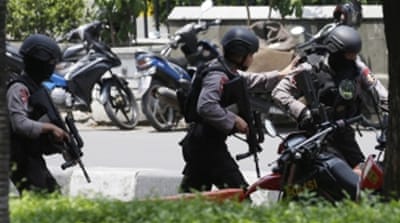![ISIL's grand plan in Asia Afghan security services arrest two alleged members of the group calling themselves the Islamic State in Nangarhar [EPA]](http://www.aljazeera.com/mritems/imagecache/mbdxxlarge/mritems/Images/2016/1/27/eac2d699d16f472f83a2fc64643a1d03_18.jpg)
A month ago, I was seated in a dimly-lit room in downtown Karachi, talking to militants representing three factions of the Taliban-al-Qaeda conglomerate that has ruled the underworld of Afghanistan and Pakistan since the 1990s.
Not generally eager to reveal themselves, let alone to talk shop with a journalist, previous twice-yearly encounters had been rather stiff affairs in which the militants would be hospitable, but not particularly forthcoming.
In the latter half of 2015, however, the militants were the ones repeatedly requesting a meeting and when it took place in December, it was clear that these hardened prodigies of Mullah Mohammed Omar and Osama bin Laden were alarmed by the rapidity with which the "Khorasan" governorate of the Islamic State of Iraq and the Levant (ISIL) group has gained strength in Afghanistan.
|
|
Broken bonds of allegiance
It was chilling to see expressions of dread on the faces of men, each of whom have fought and ruthlessly killed in Afghanistan, Kashmir, Chechnya and beyond.What worried them most was the ease with which ISIL had persuaded al-Qaeda's best - or worst - operations commanders as they were scattered from the North Waziristan tribal area by the Pakistani military.
ALSO READ: ISIL prolongs US war of contradictions in Afghanistan
The militants estimated that about 80 percent of their colleagues had broken the bonds of allegiance withered by the 2011 killing of Bin Laden and snapped by the 2013 demise of Omar, disclosed last July.
|
As in Afghanistan and Pakistan, ISIL has used the propaganda value of its sick antics in the Middle East, Africa and Europe... |
ISIL grabbed the headlines in Indonesia and Malaysia, the Muslim-majority states of Southeast Asia, by carrying out a somewhat amateurish attack on a central business district of Jakarta, nonetheless creating the kind of media hype that ISIL feeds on.
Soon after, officials in both countries disclosed that they had been alerted to the threat of ISIL-inspired attacks on public gatherings and foreigners over the Christmas and New Year holiday, and were able to prevent them by deploying tens of thousands of security personnel and arresting of the plotters.
Propaganda value
As in Afghanistan and Pakistan, ISIL has used the propaganda value of its sick antics in the Middle East, Africa and Europe to attract the several hundred orphaned militants from Indonesia and Malaysia to the frontline in Iraq and Syria. |
| Police officers take their position near the site where an explosion went off in Jakarta, Indonesia [AP] |
Security analysts say an ISIL cell, comprising Turkey-based Uighur dissidents from China's western Xinjiang province, was responsible for the bombing of Bangkok's Erawan Shrine in August. The same cell was said to have established a regional network in southern Thailand, where occasional clashes between Muslim separatists and Thai security forces have been going on for decades.
Uighur militants associated with the al-Qaeda-affiliated East Turkestan Islamic Movement were previously based in Pakistan's tribal areas until forced to relocate to Syria by the military offensive there in the summer of 2014. The same cell was subsequently reinforced by Syrian militants sent to Thailand in late October to target Russians, according to an alert sent to the Thai authorities by Russia's FSB security agency.
ALSO READ: ISIL won't get very far in Afghanistan - for now
Now the cell is instrumental in ISIL's aim of uniting the disparate groups of the region under the umbrella of a new governorate, the leadership of which is being contested by figures in Indonesia and Malaysia, and in the Muslim-majority Philippine state of Mindanao, where President Benigno Aquino is struggling to obtain Congressional ratification for a 2014 autonomy agreement with Muslim separatists.
Meanwhile, Indian authorities arrested members of an ISIL cell on suspicion of plotting an attack on the Republic Day parade in New Delhi attended by French President Francois Hollande, which went off without incident on Tuesday.
Political circumstances and time, it seems, are on ISIL's side.
ALJAZEERA
YEMI

0 comments:
Post a Comment